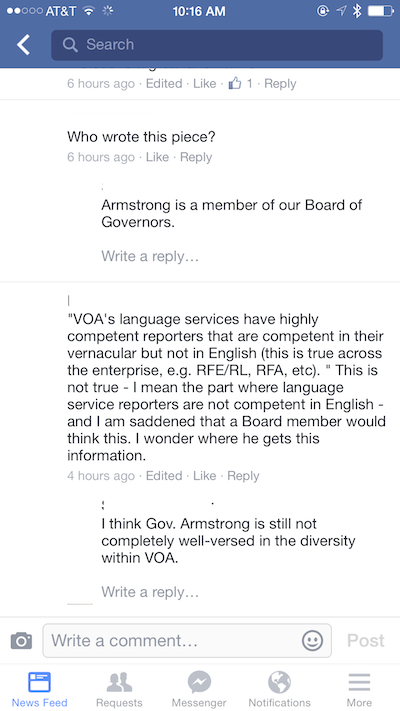BBG Watch Commentary
A former Voice of America senior correspondent has sent us an analysis of a recent article by Broadcasting Board of Governors (BBG) member Matt Armstrong. In his article, Mr. Armstrong presents VOA as an outstanding news organization which only needs a little tweaking, a few more English translators and willing American customers to become a major source of superior foreign news reporting for what he portrays as inadequate U.S. domestic media’s international news coverage.
Mr. Armstrong argues that U.S. domestic media is in great need of such VOA news content and that VOA can provide it. BBG Watch pointed out that exactly the opposite is true. It is VOA that needs help. Most of U.S. domestic media’s foreign news content is in fact far superior to what VOA is capable of producing in English after having been mismanaged for many years and made dysfunctional as a news organization.
Some of Mr. Armstrong’s assertions are so at variance with reality that BBG Watch described them as “propaganda of success.” At least two current VOA journalists and managers posted public comments on Facebook saying that they are “saddened” by Mr. Armstrong’s observations and that he “is still not completely well-versed in the diversity within VOA.”

SEE: Misplaced priorities of BBG Governor | BBG Watch | August 24, 2015
SEE: Thoughts about CBS Evening News going to VOA’s Steve Herman for Bangkok bombing coverage | By Matt Armstrong | MountainRunner.us | August 21, 2015
A former Voice of America senior correspondent who prefers to remain anonymous because of professional and personal contacts with numerous current and former BBG employees and executives, described Mr. Armstrong’s article as designed “to pander to policy circles.” The journalist blames the BBG’s and VOA’s leadership for “bungled decisions and strategies in recent years” and observes that “VOA highly respected decades ago is no more.”
Jargon and Buzzwords
An Analysis By A Former VOA Senior Correspondent
Mr. Armstrong’s comments that steps are underway to rebuild VOA English capability, are interesting to say the least.
Beginning in the late 1990’s and extending into the first decade of the 2000s, VOA English was under straight out assault by managers who steadily eroded programming and staff devoted to it.
Those in VOA’s central newsroom well remember [former director] David Ensor’s comments that he would not hesitate to “cut [you]”. That was a time when Ensor and his chief deputy were preparing steps that led to the evisceration of the newsroom’s capabilities….and creation of the “43 newsrooms,” with the problems that brought along.
The English programming that in past decades had given VOA at least a shot at competing with the BBC, was steadily eroded. Congress again placed language in appropriation bills to try to preserve English, as it did under the George W. Bush administration.
The reality is that VOA English broadcasting today is a shadow of what it used to be. Even if VOA were able to ramp back up, it has also done away with much of its actual radio broadcasting and programming in the language.
Though it faces questions about its future, the BBC World Service, with its superb programs such as Newshour and others (widely carried by U.S. radio stations), and equally dominating online content, is so superior that VOA would be playing catch up.
Armstrong spends a lot of time discussing the revision of Smith-Mundt Act, that led to someone like Herman, who unlike most other VOA correspondents has obtained strong social media following, being able to do a live report for CBS.
One has to ask — just what is it that Armstrong is proposing? Is this going to be GNN redux? (a reference to the grand scheme under former BBG chairman Isaacson, eventually shelved, that would have turned BBG into a Global News Network).
From the sound of it, Armstrong and perhaps others believe that VOA can, indeed, be built into a major competitor to others in what he calls the “news media business”, despite the widespread dysfunctions existing throughout the agency.
Remember that Ensor for quite some time described VOA as a news company . . . but was also fond of referring to VOA as a “state broadcaster”.
This was part of a campaign of pandering, that continues to this day, an attempt to repair damage done in recent years to VOA’s news reputation and capabilities and push back on legislation in Congress to overhaul the BBG.
The reporting by Herman [VOA correspondent] on events in Bangkok, admirable as it was, does not mean that CBS, or ABC, or CNN are going to begin using VOA reporters every day in their newscasts.
Keep in mind that the VOA highly respected decades ago is no more. This is largely a result of bungled decisions and strategies in recent years that have reduced it to a laughing stock in official Washington.
Remember, this is the VOA that President Barack Obama granted exactly one interview to over his two terms in the White House (Obama chose to give the BBC a 22 minute long sit-down before his Kenya trip). . .
. . . a VOA that, before it came under intensive criticism for its coverage failings, would not even carry live video of major presidential statements. . . a VOA that was not rapidly on the ground when the Ferguson, Missouri riots broke out last year.
In remarks in VOA’s central news division in 2014, Armstrong told staff that they should accept a new reality in which VOA would be a conduit for paid wire service reports.
To sum up his thrust — VOA should not worry about being first on breaking news stories — indeed, it should merely run AP and Reuters. There was also an ideological piece to this, reflecting Armstrong’s view of what VOA should be providing to foreign audiences (see below).
Now, he is doing his best to promote VOA’s breaking news capability, and pointing to the Smith-Mundt revision, and suggests that VOA will become a go to source for CNN, CBS and others, of incisive news provided by government-paid journalists.
But keep in mind the comment by a VOA official several years ago. Voice of America, he said, long ago lost the opportunity to become a destination of choice for global online audiences.
Like the former VOA director, Armstrong uses this piece to pander to policy circles in Washington. That’s because he and others know that the days when VOA could pretend to be only a news organization, are over and won’t return.
Indeed, in his 2014 remarks, Armstrong himself said VOA exists, paid for by the taxpayer, because of national security.
In that, Armstrong is correct. What some of VOA’s own journalists are resistant to, is that there is no way that the foreign and national security objectives of the United States can be kept separate from news.
VOA officials — including those involved in or influencing news coverage — have connections and communication with the State Department and the White House.
So, predictably — in a piece focusing on the respectable efforts of one VOA correspondent — Armstrong tosses in mentions of ISIS and Russia, while promoting VOA as a “free resource” for commercial media, who he recommends should “redevelop” their capacity.
Armstrong stresses that his writing was not “cleared” by anyone (agency employees are subject to regulations requiring that writing about policy be vetted) and talks about having to unpack, as he puts it, stories for [non-American] English audiences.
This revisits past remarks in which he appeared to be trying to turn news reporting into a pretzel, suggesting at one point that reporters should be adapting each of their stories to the “lens” and “needs” of each audience, and that VOA’s primary role should be “enabling….populations.”
Armstrong seems to believe that even today, VOA reporters are distracted by an American audience, and should concentrate on just certain salient points especially designed and constructed for specific viewers or listeners.
This appeal for . . . no other word can describe it….simplification, of reporting based on what seem to be special formulas shaped by audiences in specific locations, should be concerning.
If John Lansing, the new BBG CEO, is smart, he will not simply swallow the kind of jargon, buzzwords and esoteric language that Armstrong puts out to create an illusion of truth or plausibility, and spend time thoroughly examining the full spectrum of problems revealed and reported on in recent years by BBG Watch.
